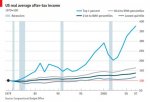As ataraxia points out: That isn't even
remotely true.
"Trickle down" claims that slashing taxes on businesses and the wealthy benefits the entire nation. It's sheer nonsense.
If a company gets a tax break of, say, 10%, what is it going to do with the cash? Will the company spend on capital investments? Will it hire more employees? Will it give its employees raises? Will it spend more on R&D? No, no, no, no. Management will only do what it thinks is required to enhance profitability and/or share price. Credit is already insanely cheap, meaning few companies are genuinely unable to access capital for its own infrastructure. The pressure to cut costs does not evaporate because one of its expenses dropped slightly. Thus, we end up with debacles like Gary Cohen's WSJ meeting with a large group of CEOs:
On the individual level, what happens when the rich get a big tax break? Not much. They are already saving over half of their incomes, so all they're doing is saving it. At best, giving them a tax cut will result in a slight increase in the prices of assets where they stash their capital.
Now, we should note that there is really only one situation where cutting taxes on the wealthy does increase their spending (and tax revenues), which is when top tax rates are incredibly high -- as in, around 90%. (Literally, 90%.) This encourages those earners to dodge taxes, or just not pay them. However, we are nowhere
near those kinds of tax levels, as the effective tax rate for the top 1% is around 22%. (This is less than most middle-class taxpayers, which are 25-30% iirc.)
The reality is that we live in a consumer economy. If you want to stimulate that economy, you need to cut taxes for the poor and middle class, because
they will turn right around and spend it all. Since about 25% of those taxpayers will see higher tax rates, and the rest will receive a pittance, it's pretty clear that this tax cut does nothing more than make the rich richer. What a surprise.



